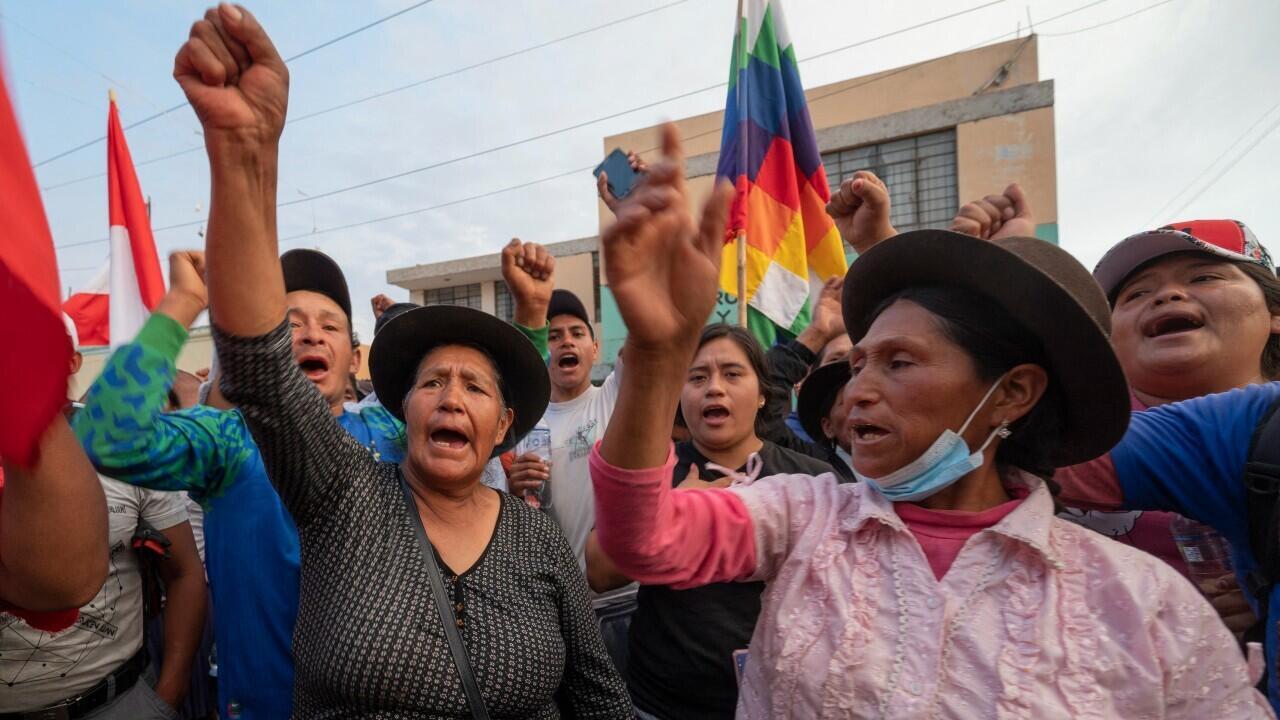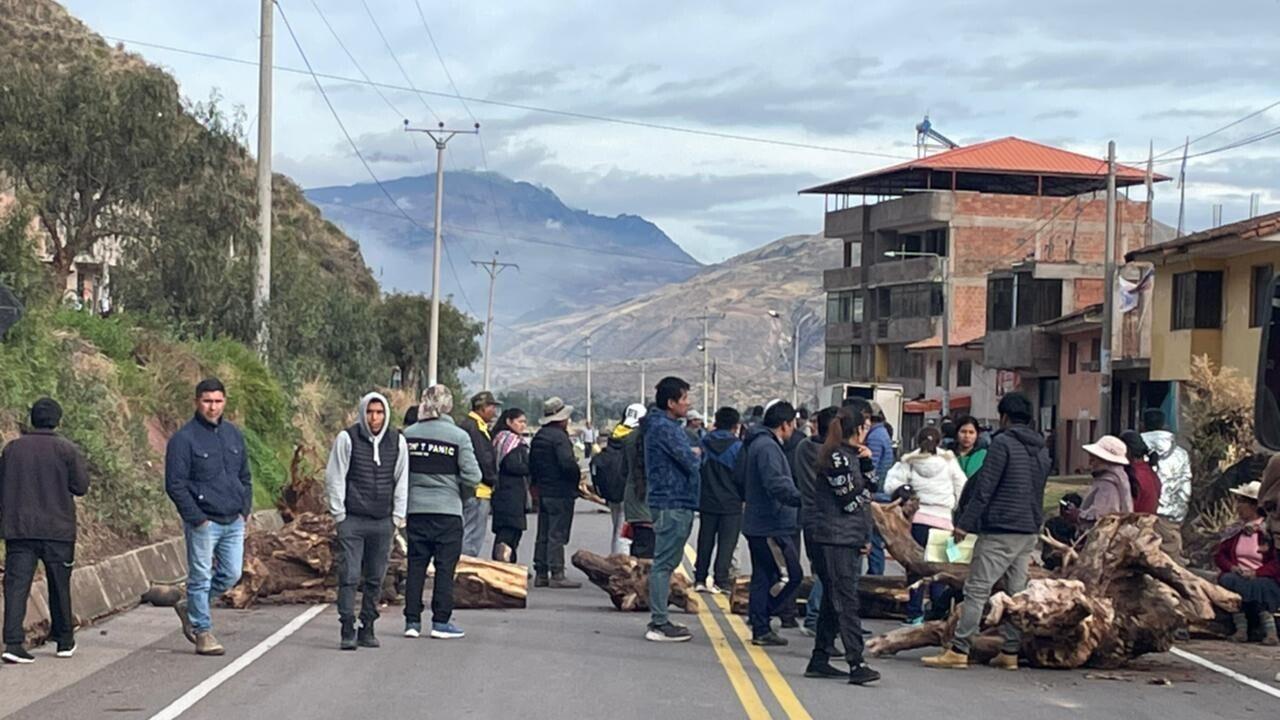More than a month after the removal of Peruvian President Pedro Castillo, hundreds of people from rural areas are marching towards the country’s capital to gather in a protest demanding the resignation of the current president Dina Boluarte and the immediate call for general elections. Tension increases, after the head of state attacked the roadblocks and warned that they will be lifted by the authorities.
With shouts such as “Dina, listen, we are not terrorists” and “fear is over”, hundreds of peasants moved to Lima, the Peruvian capital, on January 17 to demand the complete renewal of the Government.
Protesters from all over the country are calling for the resignation of President Dina Boluarte and the advancement of general elections to elect both a president and the new members of Congress in full at the polls.
The mobilizations and blockades that spread along highways and inter-municipal roads show strong social discontent, after President Pedro Castillo was removed and arrested on December 7, when he tried unsuccessfully to dissolve the Legislative Assembly.
The official calendar dictated the call for new elections until 2026, when the Castillo Administration was expected to end, but given the new political and social crisis, the deputies propose April 2024 as the closest date for voting, something strongly rejected by the activists.

The protesters try to exert pressure to hold elections in the shortest possible time and the tension increases after Boluarte attacked the blockades on Tuesday, January 17. The president warned that they will be lifted “in the next few hours” by the Public Force.
“Blocking roads or not allowing these trucks that carry gas or fuel to enter leaves the peaceful protest. We, through the Police (…) will be opening the roads in the next few hours,” said Boluarte, who served as vice president of Castillo and assumed the leadership of the Executive after the dismissal of the then ruler.
The political leader added that the demand for the closure of Congress and a Constituent Assembly is a “pretext” to take control of the highways and “continue breaking the institutional framework in the country.”
At least 18 national highways are affected in nine regions and traffic has been interrupted in 96 points in the country, according to data from the Management and Monitoring Center.
“We do not recognize Boluarte”
Asked about the president’s warnings against blocking roads, activists interviewed by the France 24 correspondent in Peru, Francisco Zacarías, assured that the blockades will intensify.
Another protester pointed out that “we do not recognize Boluarte as president and we are not going to obey what she says.”
A scenario that will foreseeably bring new clashes between the protesters and the authorities, after fateful weeks.
At least 42 people have been killed since fighting began in December, according to Peru’s Ombudsman’s Office.

Several cities and towns have been the epicenter of the demonstrations, including the touristic Cusco and the regions of Puno, Arequipa and Ayacucho, in the south.
But the final destination for many is Lima.
The France 24 team in the area, Francisco Zacarías, Xiomara Parra and Rosario Urbina, pointed out that more than 2,000 people, including pregnant women and children, walked through the rain on a highway between Huaraypata and Cusco, amid the blockade of hundreds of vehicles , to join the big protest in the capital.
Supporters of the ousted president, who remains detained and charged with rebellion, among other crimes, after he tried to rule by decree, have set burning barricades, attempted to storm airports and organized mass demonstrations in recent weeks.
“We are going to be in the capital to make our protest voice heard,” said Jimmy Mamani, an Aymara indigenous leader from the Puno region and mayor of a small town near the border with Bolivia.

The indigenous leader affirmed that peasants from all over the nation seek to gather in the capital for a “peaceful” demonstration. However, he also compared the protest to the massive three-day march that in July 2000 led to the overthrow of then-president Alberto Fujimori.
“It is not right that the Executive cannot listen to our demands, they turn a deaf ear,” he added and ruled out dialogue with the authorities.
Boluarte supports voting on elections in 2024, but “it is not enough”
While the protests grow in the streets, in Congress the legislators insist on their proposal to advance elections to April 2024, a date considered distant by those who demonstrate.
This Tuesday, the Legislature approved the start of the new legislature for next February 15. This is a date that was pending approval, since from that moment the congressmen will hold the second vote necessary to ratify the bill that proposes that the general elections be brought forward in one year and three months. The first vote for this goal was held last December.
The measure was supported in the last few hours by Boluarte, who had previously called for the elections to be held in December 2023.
“I congratulate the attitude of Congress, indeed, the population is waiting for this early election, the second vote was without a date, it’s good that Congress has decided that they will hold this second vote in the fortnight of February and they will ratify this early election” , declared the president.
? The President of the Republic spoke out against road blocks in several regions and stated that the demand for the closure of Congress and a Constituent Assembly is a pretext to continue taking roads.https://t.co/7XDYA7il2x
– RPP News (@RPPNoticias) January 17, 2023
Boluarte maintained that when the advance of general elections takes place “we are all going to leave”, in a clear allusion to the demand of the protests.
However, the date put on the table is rejected from various spectra.
“You cannot play with a neither for you, nor for me, in a country that is losing too much due to conflict. These popular demands have not been minimally met because the early elections, which were held on December 20, have not been confirmed, and we do not know, for sure, if they are going to achieve more than 87 votes for that vote to be in order. , emphasizes an editorial in the newspaper ‘El Comercio’.
For now, thousands of peasants continue their journey to unite with one voice and once again make clear their demand for immediate elections, in a country submerged in a spiral of violence and abrupt changes of government in the last six years.
With AFP and local media






![[Img #74675]](https://thelatestnews.world/wp-content/uploads/2024/12/They-discover-a-new-class-of-X-ray-sources-in-the-150x150.jpg)







